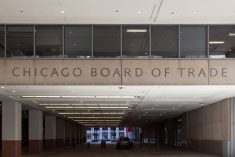CHICAGO, Ill. (Reuters) — Emails between former senior executives at Kraft Foods are among the evidence in a U.S. lawsuit accusing the company and Mondelez International of manipulating wheat prices.
The U.S. Commodity Futures Trading Commission has accused Kraft Foods Group and Mondelez of making massive bets in Chicago’s futures markets in late 2011 as part of a plot to drive down the physical price for the wheat they used to make their products.
Kraft, which spun off its snack business into Mondelez in 2012, said Mondelez would bear most of the costs of the case.
Read Also

U.S. livestock: Cattle futures slow descent
Chicago cattle futures fell on Thursday but to a lesser degree compared to Wednesday’s limit-down drop. Most-active December live cattle…
The trading commission filed the manipulation charges partly using power derived from the 2010 Dodd-Frank financial overhaul. The agency used the provision in 2013 to obtain a $100 million settlement against JPMorgan Chase & Co for its “London Whale” trades.
Dry weather around the world was pushing up wheat prices when the U.S. regulator alleges Kraft and Mondelez devised a plan to manipulate markets to save millions of dollars buying the grain.
At the time, Kraft was one the country’s top users of soft wheat, which is used to make cookies and crackers. It consumed 30 million bushels a year, which represents seven percent of last year’s crop, the commission said.
The company was not eager to pay up for physical wheat, according to the lawsuit. Instead, Kraft made a dramatic change to its buying practices by entering contracts on the Chicago Board of Trade for $90 million of wheat futures representing a six month supply, the regulator said.
Company executives, including its chief financial officer and a top procurement director, wanted to “induce sellers to believe” Kraft planned to take delivery of loads of wheat when the company never intended to take delivery, according to the commission.
An October 2011 email to Kraft’s former chief financial officer and other senior executives from its senior director of global procurement laid out the plan to depress prices, according to the agency, which included a snippet in the lawsuit.
Another email from the procurement officer six weeks later confirmed the strategy was working, the trading commission said. The lawsuit did not name the executives.
Kraft was in line to save $7 million on the commercial cost of wheat and make up to $3 million from moves in the futures market “if all goes according to plan,” the second email said, according to a portion contained in the lawsuit.
Kraft had typically bought most of its wheat directly from farmers or dealers on the physical market and aimed to keep a two month’s supply in its inventory, the lawsuit said. The company had never before owned 15 million bu., which was three times its storage capacity, according to the commission.
Kraft, as a hedger, is supposed to use futures to offset the risk of a position in the physical market and to enter trades in ways that are not disruptive to the marketplace.
However, U.S. regulators say Kraft affected the futures market and caused physical prices in Toledo, Ohio, where the company grinds 90 percent of the wheat it buys into flour, to drop five percent during the first week of December 2011. Kraft earned more than $5.4 million by manipulating the markets, according to the commission.
Scott Irwin, an economist at the University of Illinois, said the relatively small profit for Kraft made the regulator’s manipulation charges seem strange.
“If you’re going to manipulate the market, I would think that they would do it in a bigger way than that,” he said.














